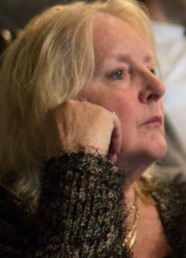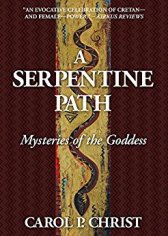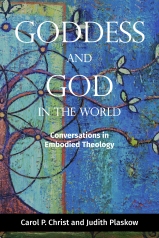 In our book Goddess and God in the World, Judith Plaskow and I discuss and debate our contrasting and conflicting views of the nature of divinity and the cause of evil. In the passage that follows, I respond to Judith’s questions.
In our book Goddess and God in the World, Judith Plaskow and I discuss and debate our contrasting and conflicting views of the nature of divinity and the cause of evil. In the passage that follows, I respond to Judith’s questions.
This brings us to the major philosophical issue that divides us: the nature of divine power and the relation of divine power to the world. It is fair to say that our major difference in this regard is whether the divine power is personal, conscious, intelligent, loving, and good. You ask, “If all we know of that exists is a mixture of the good and the bad . . . , if our creativity and the creative power that births and sustains the world brings forth both good and evil, then how can the Goddess be less than ambiguous? How can the Goddess be ‘the ground of all being’ if she does not ‘form light and create darkness, make weal and create woe’ (Isa. 45:7)? This question lies at the heart of our differences.
. . .
You ask whether “evil finally has less metaphysical warrant or reality than good” in my worldview. The simple answer is no. This question calls forth another: What is evil? Is death or dying evil? Under what conditions? Is harming another individual always evil? Again, under what conditions? In my view, death and dying are not evil per se. Death and dying are among the conditions of finite life on planet Earth. Everything that is born will die. Some, like my baby brother, die before they have had a chance to live; others die after long and meaningful lives.
Not having created the evolutionary process and recognizing that it was created by a multiplicity of individuals over the course of billions of years, I do not feel that I have the right to judge one death unjust and the other just. The death of finite individuals is for me simply a fact of life. Moreover, human beings and other animals must eat to live. Human beings can choose not to eat other animals, but they cannot choose not to eat animals and not to eat plants.
The taking of life is one of the conditions of animal life, a condition that humans share with other animals. The fact that animals can live only by taking other lives is a fact of life in our world. It is also true that other individuals in this world live by feeding on us, not only on our dead bodies (the worms crawl in) but also on living bodies—sometimes the feeding of other individuals on living human bodies in the form of bacteria or viruses takes human life. This too is a fact of life in our world.
I am not interested in denying these facts or in projecting a world where death is overcome. We also live in a world where, even in the best of circumstances, there are competing interests, many of which can be considered good in themselves. Do I really have more of a right to live than the plant or animal I eat or than the bacteria that are living in my body? If all individuals in the web of life have a right to life, then no one of us can live without harming other individuals. I do not call these facts of life evil.
Skipping over what may be a number of steps in between, let us think about the harm that is done through domination in human relationships and communities. I do not believe that male domination over women, enforced through violence, is natural or inevitable. I do not believe rape, genocide, war, and slavery are inevitable. I believe patriarchy is a system of male domination created at the juncture of the control of female sexuality, private property, and war, in which the rape of women, the killing of people, and the holding of slaves are justified.
I am interested in the new research on egalitarian matriarchal societies, which are not the opposite of male dominant patriarchal societies because they are not based on dominance. These studies show that people can live very well without controlling female sexuality, without private property, without slaves, without domination, and without war. This new research is not a reiteration of nineteenth century theories of a golden age in prehistory, but rather is based on study and interpretation of living matriarchal societies. Moreover, nineteenth and early twentieth century theories discussed matriarchy within an evolutionary framework in which it was necessary for matriarchy to be superseded by patriarchy in order for rationality and individualism, claimed to be the hallmarks of civilization, to evolve. In contrast, modern matriarchal studies is critical of patriarchy and does not view it as an evolutionary advance.
The Mosuo who live on Lake Lugu in the Himalayas are a prime example of a matriarchal society: their way of life may be a remnant of what were once more widespread cultural patterns. The Mosuo culture honors mothers in a matrilineal and matrilocal clan system in which everyone continues to live in the maternal clan. Both males and females are encouraged to become as loving and generous as the mothers who raise them. In Mosuo society, men visit their lovers at night and return to their maternal homes in the morning. Love is free because it is not tied to property or the rearing of children, surplus wealth is shared, and systems of checks and balances are in place to ensure that everyone’s voice is heard. Fatherhood is usually known, but not considered important: maternal uncles are the male role models for their sisters’ children. Grandmothers and great-uncles together make the final decisions for the clan.
The traditional spirituality of the Mosuo includes reverence for the Mountain Goddess Gemu, who is honored as a great and giving mother. The Mosuo believe the tears of the Mountain Goddess created Lake Lugu. Mountains are sacred in traditional cultures not only because they are visible as the people go about their everyday lives, but also because rain and snow fall on them, creating rivers and streams that flow down to the valleys, providing the water that sustains life for the people who live below them. It makes me very happy to know that the Mosuo culture exists. I believe that similar social structures must have been the foundation of the highly artistic, peaceful, egalitarian, settled, agricultural societies of Old Europe that worshiped the Goddess as the power of birth, death, and regeneration in all of life.
The Mosuo culture shows that the suffering created by structures of violence and domination is not a universal fact of life on planet Earth. I do not grant dominator societies the status of inevitability. That they are a possibility is obvious. I am quite willing to call structures of domination enforced by violence evil. In regard to systems of domination that have existed for the past five thousand or more years, I do not hold Goddess or God to be the cause of them, nor do I think Goddess or God has the power to undo the harm that has already been done. The power of the Goddess is the power to inspire us to create more harmonious ways of living together on our planet. I imagine Goddess is pleased that more and more people are learning about societies of peace.
***

 Read more in Carol’s new book written with Judith Plaskow, Goddess and God in the World: Conversations in Embodied Theology. Be among the first to order A Serpentine Path, Carol’s moving memoir.
Read more in Carol’s new book written with Judith Plaskow, Goddess and God in the World: Conversations in Embodied Theology. Be among the first to order A Serpentine Path, Carol’s moving memoir.
Carol wrote the first Goddess feminist theology, Rebirth of the Goddess and with Judith Plaskow co-edited the path-breaking Womanspirit Rising and Weaving the Visions.
Join the spring Goddess Pilgrimage to Crete by Feb 28. Save $200.


Women’s liberation is self-liberated — men didn’t set us free, we set ourselves free. And that’s why the women’s march too so incredibly important.
But also when I see books like GODDESS AND GOD, or a SERPENTINE PATH, and both authored by Carol P. Christ and Judith Plaskow, I feel deeply empowered, because we are not begging society to support our gender equality, we are doing that on our own, we ourselves took the reins and have made it possible.
LikeLike
both authored by me, only one by Judith…
LikeLike
Thank you for this wonderful excerpt, Carol. I’ve bought your book and it’s waiting to be read on my Kindle. When I read “Leaving Mother Lake,” I was spellbound. If only our society were like that!
LikeLike
Yes the reality of a better way is so evident among the Mosuo.
LikeLike
I enjoyed the book enormously and reviewed it for SageWoman. I do not, alas, know when the review will be published. Hopefully pretty soon!
LikeLike
I think very soon, I received a preview of your review last week. Thanks so much. Anyone else out there who can review it, we would be appreciative!
LikeLike
Thank you for this post and for information on the Mosuo people. It is so important to get the word out about societies of peace. It is so much easier to make positive changes in our own society when we have models for better ways of living together peacefully, justly, and sustainably that have already succeeded.
LikeLike
Link’s not working for me?
LikeLike
It should be working now.
LikeLike
Do you not think that wealth gives us the power to dominate and get our own way but poverty keeps us in bondage and submission to circumstances? So much of the world’s problems are due to wealth inequality which is getting worse.
LikeLike
Yes Kersten wealth gives the power to dominate. This may be one of the reasons matriarchies practice gift-giving: those who have wealth share in communal feasts and celebrations. Of course wealth intersects with racist, sexist, and colonialist ideologies that support the idea that certain kinds of people should be wealty and others their subordinates.
LikeLike
Doesn’t our ambitious nature lead us all to seek wealth and so we have the wealth pyramid with the elite at the top and the starving destitute at the bottom. Sadly nature also endows us very differently , some have no gifts of brain or health so through no fault of their own they stay on the bottom of the pile. Some are born into poor nations with very low standards and over this they have no control. About 200 million Indians defecate in the open.
LikeLike
I beg to disagree, it is not proved that we have an innate will to gain wealth in order to dominate. This is not the case in every culture. It is not even the case for everyone in our own culture.
LikeLike
I wonder what led European society to the greedy system of profit, ownership, and individualism that we have today. I include America in “European” because our ancestors took over this area and established our present system. Older, indigenous groups had/have a more community focus of sharing and the common good. Rather than sending “offenders” to jail, they sought to bring them back into the community. Wealth was measured by how much a person gave away at a ceremony to honour another.
It seems much more “civilized” to me.
LikeLike